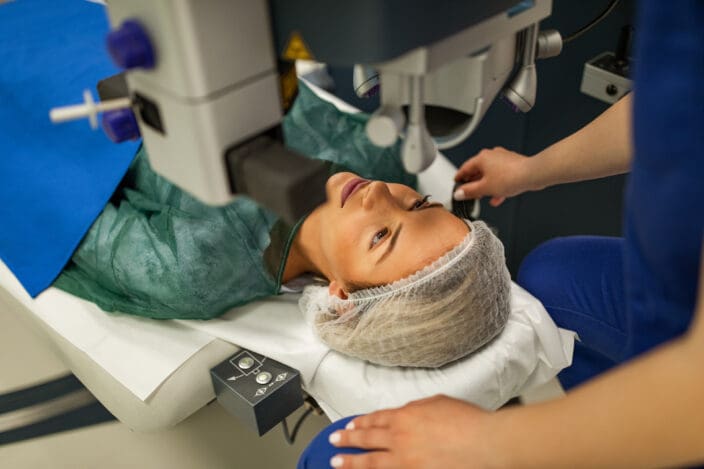
NVISION® - Sacramento/Midtown
LASIK in Midtown Sacramento
Our outstanding ophthalmologist team at NVISION® Eye Centers in Sacramento/Midtown, takes pride in delivering exceptional care for our patients. As a member of the downtown Sacramento community since 1987, we understand that every patient is unique and we provide comprehensive eye care services with a personal, professional, and customized approach. When you choose us for your laser eye surgery, you choose a team of talented surgeons and highly trained staff, all dedicated to delivering the highest-quality medical and surgical care.
Corrective Vision Eye Surgeries in Midtown, Sacramento
- LASIK (Laser-Assisted in Situ Keratomileusis): One of the most common types of laser eye surgery and involves creating a thin flap in the cornea, reshaping the underlying corneal tissue with a laser, and then repositioning the flap.
- PRK (Photorefractive Keratectomy): In PRK, the outer layer of the cornea (epithelium) is removed and the underlying corneal tissue is reshaped with a laser. The epithelium regenerates naturally after the procedure.
- LASEK (Laser Epithelial Keratomileusis): Similar to PRK, LASEK involves the removal of the outer layer of the cornea, but the epithelial layer is preserved and replaced after the corneal reshaping.
- SMILE (Small Incision Lenticule Extraction): This is a minimally invasive form of laser eye surgery that involves creating a small incision in the cornea to remove a lenticule, thereby reshaping the cornea.
- EpiLASIK: In EpiLASIK, a special device called an epikeratome is used to separate and preserve the epithelial layer before reshaping the cornea with a laser.
Cataracts Surgery in Midtown, Sacramento
The following types of cataracts surgeries are effective in restoring vision impaired by cataracts, and the choice between the two depends on the specific characteristics of the cataract and the patient’s individual needs.
- Phacoemulsification: This is the most common type of cataract surgery. It involves using ultrasound energy to break up the cloudy lens (cataract) in the eye and then removing it through a small incision. After the cataract is removed, an artificial intraocular lens (IOL) is usually implanted to replace the natural lens.
- Extracapsular Cataract Surgery: This type of cataract surgery is less commonly performed than phacoemulsification. It involves removing the cloudy core of the lens in one piece, leaving the rest of the lens capsule intact. An artificial lens is then placed in the lens capsule to replace the natural lens.
Learn about all of our eye care procedures at NVISION® Eye Centers.
Not sure if LASIK is right for you?

99% SUCCESS RATE 99% of NVISION patients see 20/20 or better after LASIK

RAPID RECOVERY Resume your normal activities in 24 hours

COMFORT-FOCUSED LASIK is virtually painless and completed in minutes
NVISION® - Sacramento/Midtown
1220 25th StSacramento, CA 95816
Monday: 8:30 AM - 5 pm
Tuesday: 7:30 AM - 5 pm
Wednesday: 7:30 AM - 5 pm
Thursday: 7:30 AM - 5 pm
Friday: 7:30 AM - 5 pm
Saturday: Closed
Sunday: Closed
Jackie Wright
The service and quality of care at NVISION Eye Center Sacramento is always above and beyond at every level. Dr Andrews was wonderful doing my cataract surgery. I was ...
Theresa Justinich
I originally went to california lasik & eye & had really bad customer service with the staff & owners. I looked up nvision & saw the good reviews. I made ...
As
Great experience here with a kind and sincere staff. I sought a second opinion here at NVISION for LASIK after another opinion from a different eye care group. In short, Dr. ...
Vision Correction Procedures in Sacramento
Today's life-changing procedures make it possible to improve your vision to 20/20—or better.
LASIK Eye Surgery
LASIK eye surgery corrects nearsightedness, farsightedness, and astigmatism.

Other Procedures
Contoura® Vision LASIK
Contoura® Vision LASIK?
Contoura® Vision LASIK is an advanced form of LASIK eye surgery that utilizes topography-guided technology to tailor the laser treatment to the unique characteristics of an individual’s cornea. This technology aims to provide a more personalized and precise correction of refractive errors, including nearsightedness, farsightedness, and astigmatism. Contoura® Vision creates a highly precise and accurate map of a patient’s eyes measuring up to 22,000 unique elevation points on each eye.
Key features of Contoura® Vision LASIK include:
1. Topography-Guided Treatment:
– Contoura® Vision LASIK utilizes detailed corneal mapping or corneal topography to create a highly customized treatment plan. This map captures thousands of data points on the cornea, allowing for a more precise analysis of its shape and irregularities.
2. Personalized Correction:
– The topography-guided technology enables the laser to precisely reshape the cornea based on the unique imperfections detected in the corneal map. This personalized approach aims to address higher-order aberrations, improving not only traditional refractive errors but also the overall quality of vision.
3. Reduced Glare and Halos:
– Contoura® Vision LASIK is designed to reduce the occurrence of visual disturbances such as glare and halos, which can be associated with certain refractive errors. The customized treatment may result in improved night vision and reduced sensitivity to light.
4. Potential for Better Visual Outcomes:
– The goal of Contoura® Vision LASIK is to achieve superior visual outcomes by optimizing the correction based on the individual characteristics of the patient’s cornea.
It’s important to note that the availability of Contoura® Vision LASIK may vary, and not all LASIK centers offer this specific technology. If you are considering LASIK surgery and are interested in Contoura® Vision LASIK, it’s recommended to consult with an experienced refractive surgeon or LASIK eye doctor who can assess your candidacy and discuss the available options for personalized laser vision correction.
PRK Surgery (Photorefractive Keratectomy)
What is PRK Surgery?
PRK Surgery (Photorefractive Keratectomy) is a type of laser eye surgery that is used to correct refractive errors such as nearsightedness (myopia), farsightedness (hyperopia), and astigmatism. PRK is an alternative to LASIK eye surgery and is particularly suitable for individuals who may not be candidates for LASIK due to certain corneal characteristics.
Overview of the PRK surgery process:
- Corneal Epithelium Removal:
- In PRK, the surgeon begins by removing the thin outer layer of the cornea called the epithelium. This can be done using an alcohol solution, a special brush, or a laser.
- Laser Reshaping of the Cornea:
- Once the epithelium is removed, a laser is used to precisely reshape the cornea. The laser ablates or removes microscopic amounts of corneal tissue based on the patient’s refractive error. The goal is to correct the curvature of the cornea and improve the focus of light on the retina.
- Healing Process:
- Unlike LASIK, where a corneal flap is created, PRK does not involve creating a flap. Instead, the corneal surface is allowed to regenerate naturally. The healing process involves the growth of new epithelial cells over the treated area.
- Post-operative Care:
- Following PRK surgery, patients are given medicated eye drops to aid in the healing process and prevent infection. Recovery may take a bit longer compared to LASIK, and patients may experience temporary discomfort during the initial days.
Key considerations for PRK surgery include:
- Corneal Thickness: PRK may be a suitable option for individuals with thinner corneas who may not be ideal candidates for LASIK.
- Occupational Considerations: PRK may be recommended for individuals with occupations or lifestyles that carry a risk of corneal injury, as it eliminates the creation of a corneal flap.
- Healing Time: The initial visual recovery may take longer with PRK compared to LASIK. Patients typically experience optimal vision several weeks after the procedure.
PRK is a well-established and effective procedure for vision correction, and its suitability depends on individual factors. It’s important to consult with an experienced refractive surgeon or eye care professional to determine the most appropriate laser eye surgery option based on your eye health and lifestyle.
Pterygium Surgery
Pterygium surgery is performed under topical anesthesia on an outpatient basis.
Refractive Lens Exchange (RLE)
Refractive lens exchange (RLE), is when a clear lens is implanted to replace your eye’s natural lens to correct your vision.
This procedure is often used for pre-cataract patients, as a preventative vision correction solution. Refractive lens exchange (RLE) can also correct nearsightedness, farsightedness, and astigmatism.
Intacs® Corneal Implants for Keratoconus
The surgical implantation of intracorneal ring segments or Intacs® is a minimally invasive surgical option to improve the corneal shape in patients with keratoconus.
Intacs® are surgically inserted into a thin channel created by a femtosecond laser in the periphery of the cornea. Intacs® is also known as surgical implantation of intracorneal ring segments.
Lifestyle Lenses
Lifestyle lenses are a premium lens option that offers a more functional range of vision, and are designed to reduce the need for distance and reading glasses.
We offer the latest and most advanced lifestyle lens on the market.
Cataract Surgery
Cataract eye surgery is a very common and medically necessary procedure to remove and replace the eye’s natural lens when the vision has been clouded by a cataract. We offer laser-assisted cataract surgery and lifestyle lenses as options for our patients.
Monovision LASIK
Monovision lasik can treat presbyopia. One eye would remain slightly nearsighted while correcting your other eye for distance vision. With both eyes open, you’ll experience clear and comfortable vision both near and far.
Corneal Crosslinking (CXL)
Corneal Crosslinking (CXL) is a type of eye surgery that treats a weakened or damaged cornea.
Insurance Plans and Payment Options
At NVISION Eye Centers, we strive to make managing your care as easy as possible. In addition to working with many insurance providers, we offer a convenient online payment option for your bills. Click here to pay your bill online.
Below, you’ll find a list of the insurance companies we currently accept at this location. If your provider is not listed, please give us a call—NVISION frequently adds new insurance companies and offers many out-of-network options.
- Aetna
- Blue Cross
- Blue Shield
- Cigna
- Health Net
- Humana
- AARP
- Assurant Health
- Availity
- Bankers Life
- Delta Health Systems
- First Health
- GEHA
- Guardian
- Health Comp
- Hill Physicians
- Indian Health
- Laborer's Health and Welfare Trust Fund
- Mail Handlers
- Medi-Cal
- Molina
- Mutual of Omaha
- NALC Health Benefit Plan
- Navinet
- Operating Engineers
- Pacificare
- Palmetto RR
- Partnership
- Prudential
- Relay Health
- Risk Service
- Sutter Independent Physicians (SIP)
- Sutter Medical Group (SMG)
- Sutter Select
- Sutter West Medical Group (SQMG)
- Teamsters
- Travelers
- Tricare
- UFCW
- UHC Military West
- United American
- United Healthcare
- Western Health
- WPS Tricare
At NVISION® Eye Centers, we provide life-changing results, an exceptional experience, and a lifetime commitment to your LASIK vision correction.
- Industry-leading eye doctors and vision outcomes with more than 2 million successful procedures
- The most advanced laser and diagnostic technology available
- Financing available – no down payment, zero or low interest, low monthly payments
- Free LASIK consultations
- Use your FSA/HSA balance toward LASIK before it expires in December
Location – Sacramento/Midtown eye clinic
NVISION Eye Centers – Sacramento/Midtown, California
1220 25th St, Sacramento, CA 95816
(916) 306-8123

